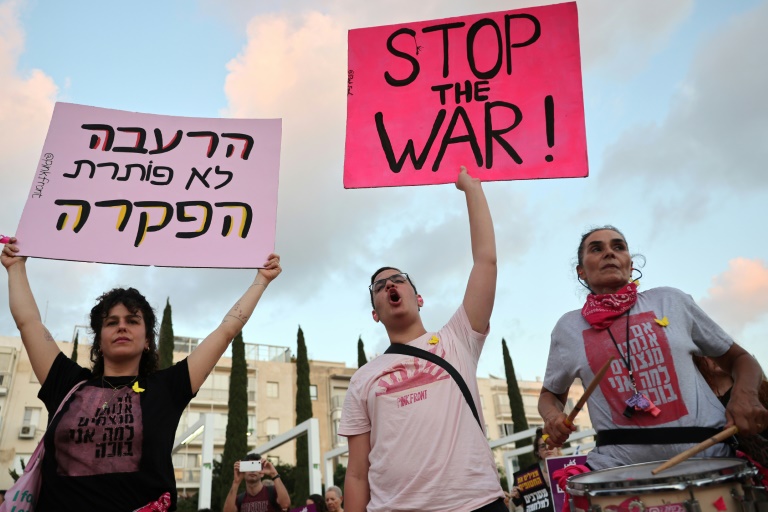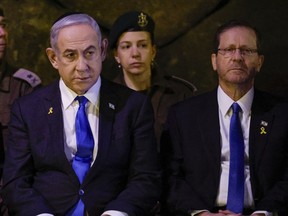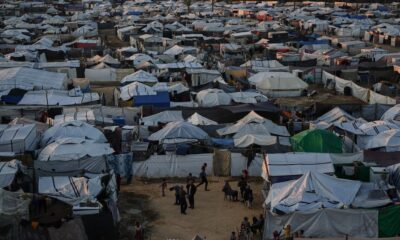World
Israel’s Gaza Conflict Worsens Internal Divisions Amidst War

The ongoing conflict in Gaza has escalated tensions within Israeli society, as families and friends become increasingly divided. Now in its twenty-second month, the war has prompted calls from hostage families and peace advocates for Prime Minister Benjamin Netanyahu to negotiate a ceasefire with Hamas and secure the release of captives taken during the October 2023 attacks. Conversely, right-wing members of Netanyahu’s cabinet are pushing to occupy and annex more Palestinian territory, a move that risks intensifying international backlash.
The societal rift is palpable, with many Israelis finding it difficult to maintain relationships in the face of starkly differing views on the war. Emanuel Yitzchak Levi, a 29-year-old poet and peace activist, expressed this sentiment during a gathering in Tel Aviv. He stated, “As the war continues we become more and more divided. It’s really hard to keep being a friend, or family, a good son, a good brother to someone that’s — from your point of view — supporting crimes against humanity.” His comments highlight the strain many feel as personal ties clash with political beliefs.
Divided Opinions and Rising Tensions
In a particularly charged moment, a cyclist confronted peace activists at the Tel Aviv meeting, labeling them “traitors” and accusing them of undermining Israel’s position against Hamas. Dvir Berko, a 36-year-old IT worker, shared a more measured perspective, criticizing the calls for a ceasefire. He contended that humanitarian aid should be withheld until the remaining 49 hostages are released, asserting, “The Palestinian people, they’re controlled by Hamas. Hamas starts this war, and in every war that happens, bad things are going to happen.”
The intensity of these debates underscores a growing polarization in Israeli society, particularly following the Hamas attacks that resulted in the deaths of 1,219 individuals. Independent journalist Meron Rapoport noted that while Israel had been divided prior to the conflict, the situation has worsened as the war continues and international scrutiny of Israel’s actions mounts. Initially, the attacks prompted a surge of national unity, but as the conflict dragged on, opinions diverged sharply.
Rapoport pointed out that, “The moment Hamas acted there was a coming together… But as the war went on, it has made people come to the conclusion that the central motivations are not military reasons but political ones.”
Recent surveys, including one by the Institute for National Security Studies, reveal that Israelis largely attribute the delay in hostage negotiations to Hamas. Only 24 percent of Jewish respondents expressed significant concern over the humanitarian crisis in Gaza, with reports suggesting that a famine is unfolding.
Calls for Change and the Future of Israeli Society
Despite the political divisions, there is strong support for the families of hostages. Many accuse Netanyahu of prolonging the war for political gain. “In Israel there’s a mandatory army service,” said Mika Almog, a 50-year-old peace activist. “These soldiers are our children and they are being sent to die in a false criminal war that is still going on for nothing other than political reasons.”
An open letter addressed to U.S. President Donald Trump from 550 former diplomats, military officials, and intelligence leaders urged Netanyahu to shift focus from military objectives to negotiations for hostage release. Ami Ayalon, a former director of the Shin Bet security agency, remarked, “At first this war was a just war, a defensive war, but when we achieved all military objectives, this war ceased to be a just war.” He warned that the ongoing conflict threatens Israel’s security and identity.
Biblical archaeologist Avi Ofer, a long-time peace advocate, shared his sorrow over the situation. Wearing a yellow ribbon that noted the war’s duration — “667” days — he stated, “This is the most awful period in my life.” Ofer acknowledged the war’s initial justification but expressed concern about the moral implications of ongoing hostilities.
As international scrutiny of Israel’s actions grows, many citizens fear that their country may be perceived as a pariah, with implications for their families serving in the military. The International Court of Justice is currently considering whether Israel has breached the Genocide Convention, a development that has raised alarms among Israelis who worry about the international ramifications of the war.
The complexities of the conflict continue to unfold, affecting not just the political landscape but also the fabric of Israeli society. As divisions deepen, the path forward remains uncertain, with the potential for significant consequences both domestically and abroad.
-

 Politics4 weeks ago
Politics4 weeks agoSecwepemc First Nation Seeks Aboriginal Title Over Kamloops Area
-

 World5 months ago
World5 months agoScientists Unearth Ancient Antarctic Ice to Unlock Climate Secrets
-

 Entertainment5 months ago
Entertainment5 months agoTrump and McCormick to Announce $70 Billion Energy Investments
-

 Science5 months ago
Science5 months agoFour Astronauts Return to Earth After International Space Station Mission
-

 Lifestyle5 months ago
Lifestyle5 months agoTransLink Launches Food Truck Program to Boost Revenue in Vancouver
-

 Technology3 months ago
Technology3 months agoApple Notes Enhances Functionality with Markdown Support in macOS 26
-

 Lifestyle3 months ago
Lifestyle3 months agoManitoba’s Burger Champion Shines Again Amid Dining Innovations
-

 Top Stories2 months ago
Top Stories2 months agoUrgent Update: Fatal Crash on Highway 99 Claims Life of Pitt Meadows Man
-

 Politics4 months ago
Politics4 months agoUkrainian Tennis Star Elina Svitolina Faces Death Threats Online
-

 Sports5 months ago
Sports5 months agoSearch Underway for Missing Hunter Amid Hokkaido Bear Emergency
-

 Politics5 months ago
Politics5 months agoCarney Engages First Nations Leaders at Development Law Summit
-

 Technology5 months ago
Technology5 months agoFrosthaven Launches Early Access on July 31, 2025





















